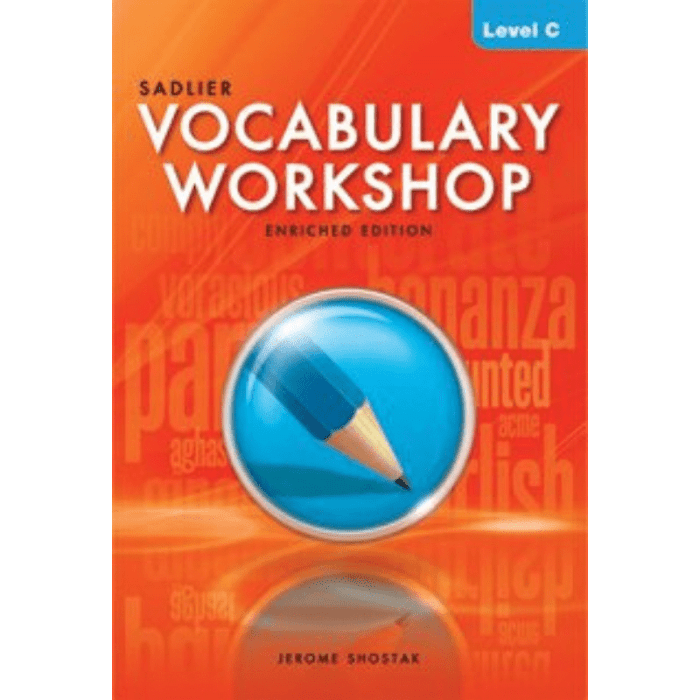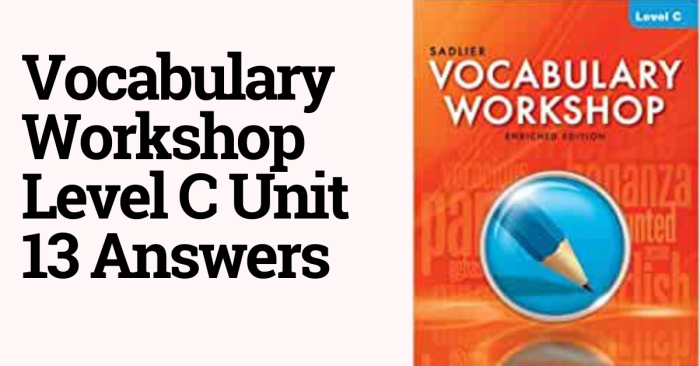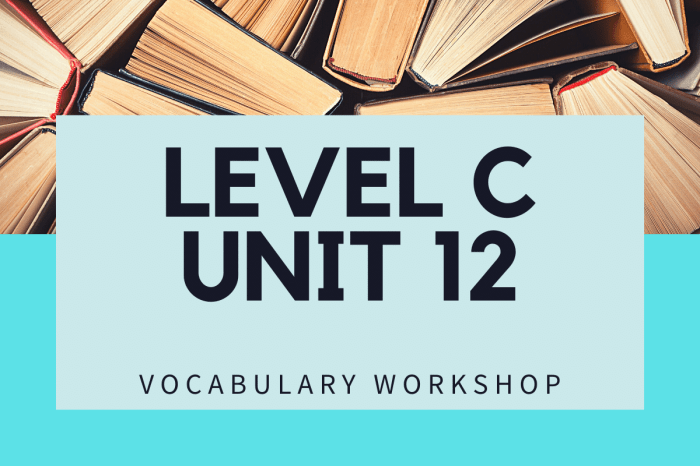Embarking on Vocabulary Workshop Level C Unit 13, we delve into the realm of language enrichment, where strategies and techniques converge to elevate your vocabulary skills to new heights. This comprehensive guide will equip you with the tools to master word analysis, expand your lexicon, and apply your newfound knowledge in meaningful contexts.
Through interactive exercises, engaging games, and recommended reading materials, this workshop fosters a dynamic and enjoyable learning environment. Prepare to embark on a linguistic adventure that will transform your communication abilities and open up a world of expressive possibilities.
Vocabulary Development Activities

Vocabulary development is a crucial aspect of language learning. Engaging and interactive activities can significantly enhance students’ vocabulary skills. These activities include:
Interactive Exercises
- Word games such as crosswords, puzzles, and word searches
- Interactive online exercises that provide immediate feedback
- Matching exercises that pair words with definitions or synonyms
Games and Puzzles
- Board games like Scrabble and Bananagrams
- Word-building games like Boggle and Wordament
- Puzzles that require students to solve clues or decode words
Recommended Reading Materials
- Novels and short stories that introduce new vocabulary in context
- Non-fiction books and articles that cover diverse topics and vocabulary
- Magazines and newspapers that provide exposure to current events and specialized vocabulary
Word Analysis Techniques

Effective word analysis techniques enable students to understand the structure and meaning of words. These techniques include:
Root Words, Prefixes, and Suffixes
Identifying root words, prefixes, and suffixes helps students understand the core meaning of words and their variations. For example, the root word “chron” means “time,” and the prefix “anti-” means “against.” Thus, “chronology” means “the study of time,” and “anticipate” means “to expect in advance.”
Etymology and Context
Examining the etymology of words (their historical origin) provides insights into their meaning and usage. Understanding the context in which words are used also aids in comprehension. For example, the word “decimate” originally meant “to kill one in ten,” but its meaning has evolved to mean “to destroy a large number of something.”
Synonyms, Antonyms, and Homophones
Identifying synonyms (words with similar meanings), antonyms (words with opposite meanings), and homophones (words that sound the same but have different meanings) helps students expand their vocabulary and improve their understanding of word nuances. For example, “happy” and “joyful” are synonyms, “up” and “down” are antonyms, and “there” and “their” are homophones.
Vocabulary Expansion Strategies: Vocabulary Workshop Level C Unit 13
Active vocabulary acquisition is essential for language proficiency. Effective strategies include:
Flashcards
Creating and reviewing flashcards is a simple but effective way to memorize new words and their meanings.
Vocabulary Journal
Keeping a vocabulary journal allows students to record new words, definitions, and usage examples.
Wide Reading
Reading widely exposes students to a variety of vocabulary and helps them learn words in context.
Inferring from Context Clues
Teaching students to infer word meanings from surrounding text is a valuable skill that enhances their comprehension and vocabulary.
Dictionaries and Thesauruses
Using dictionaries and thesauruses helps students find definitions, synonyms, and antonyms, expanding their vocabulary and improving their writing.
Contextualized Vocabulary Practice

Using vocabulary words in meaningful contexts is crucial for retention and comprehension. Practice activities include:
Sentence Writing
Asking students to write sentences using target vocabulary words ensures that they understand and can apply the words correctly.
Paragraph and Story Writing
Encouraging students to write paragraphs or short stories using the vocabulary allows them to demonstrate their understanding and creativity.
Discussions and Debates
Engaging students in discussions or debates using the target vocabulary provides opportunities for active use and reinforces their understanding.
Real-World Connections
Connecting vocabulary to real-world situations makes learning more meaningful and memorable. For example, discussing the vocabulary of environmentalism while discussing climate change.
Assessment and Evaluation

Regular assessment is essential to track students’ progress and provide feedback. Methods include:
Vocabulary Tests
Formal vocabulary tests assess students’ knowledge of word definitions, usage, and spelling.
Writing Samples, Vocabulary workshop level c unit 13
Analyzing students’ writing samples can reveal their vocabulary usage and understanding.
Oral Presentations
Oral presentations allow students to demonstrate their vocabulary knowledge and communication skills.
Clear Learning Goals
Setting clear learning goals helps students understand the expected outcomes and track their progress.
Feedback and Support
Providing timely feedback and support is crucial for student growth and motivation.
Frequently Asked Questions
What is the primary goal of Vocabulary Workshop Level C Unit 13?
To enhance vocabulary skills through interactive exercises, word analysis techniques, vocabulary expansion strategies, contextualized practice, and assessment.
How does the workshop foster active vocabulary acquisition?
By incorporating flashcards, vocabulary journals, wide reading, and inferring word meanings from context clues.
What assessment methods are recommended to track student progress?
Vocabulary tests, writing samples, oral presentations, and regular feedback.